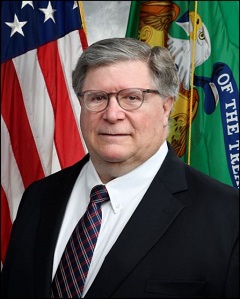Special Inspector General for Pandemic Recovery
Special Inspector General for Pandemic Recovery (SIGPR) is a federal oversight authority established to monitor and audit the financial management and disbursement of funds provided by the Coronavirus Aid, Relief, and Economic Security Act (CARES Act), which was enacted on March 27, 2020, in response to the COVID-19 pandemic. The SIGPR is tasked with overseeing the implementation and use of the CARES Act's economic relief provisions, with a focus on ensuring transparency, preventing and detecting fraud, waste, abuse, and mismanagement of the funds.
Background[edit | edit source]
The COVID-19 pandemic, which began affecting the United States in early 2020, led to unprecedented public health and economic challenges. In response, Congress passed the CARES Act, a $2.2 trillion economic relief package aimed at providing immediate and direct economic assistance to American workers, families, and small businesses, and preserving jobs for American industries. The Act included provisions for direct financial assistance to Americans, loans and grants for businesses, unemployment benefits, and funds for healthcare providers.
Role and Responsibilities[edit | edit source]
The role of the Special Inspector General for Pandemic Recovery includes:
- Auditing and investigating the use of funds distributed under the CARES Act.
- Reporting to Congress on findings, including any instances of fraud, waste, abuse, or mismanagement.
- Overseeing the efforts of federal agencies in managing the economic relief programs.
- Ensuring that the allocation and disbursement of funds are transparent and follow the law.
The SIGPR is authorized to conduct, supervise, and coordinate audits and investigations of the loan, loan guarantee, and other investment programs established by the CARES Act. The office works closely with other federal oversight bodies, including the Pandemic Response Accountability Committee (PRAC) and the Government Accountability Office (GAO), to ensure comprehensive oversight of pandemic relief efforts.
Appointment and Tenure[edit | edit source]
The Special Inspector General for Pandemic Recovery is appointed by the President of the United States and confirmed by the Senate. The position requires a nominee with a strong background in financial oversight, law enforcement, or a related field, capable of managing complex investigations and audits.
Challenges and Impact[edit | edit source]
The SIGPR faces numerous challenges, including the vast scale of funds to be overseen, the urgency of the pandemic response, and the complexity of the programs involved. Effective oversight is crucial to ensure that the relief funds reach the intended recipients and are used effectively and efficiently to mitigate the economic impact of the pandemic.
The work of the SIGPR has significant implications for public trust in government spending and the overall effectiveness of the federal response to the COVID-19 crisis. By identifying and addressing issues of fraud, waste, and abuse, the SIGPR plays a critical role in ensuring that the substantial investments made in pandemic recovery achieve their intended outcomes.
See Also[edit | edit source]
- Coronavirus Aid, Relief, and Economic Security Act
- COVID-19 pandemic
- Pandemic Response Accountability Committee
- Government Accountability Office
This article is a government-related stub. You can help WikiMD by expanding it!
Search WikiMD
Ad.Tired of being Overweight? Try W8MD's physician weight loss program.
Semaglutide (Ozempic / Wegovy and Tirzepatide (Mounjaro / Zepbound) available.
Advertise on WikiMD
|
WikiMD's Wellness Encyclopedia |
| Let Food Be Thy Medicine Medicine Thy Food - Hippocrates |
Translate this page: - East Asian
中文,
日本,
한국어,
South Asian
हिन्दी,
தமிழ்,
తెలుగు,
Urdu,
ಕನ್ನಡ,
Southeast Asian
Indonesian,
Vietnamese,
Thai,
မြန်မာဘာသာ,
বাংলা
European
español,
Deutsch,
français,
Greek,
português do Brasil,
polski,
română,
русский,
Nederlands,
norsk,
svenska,
suomi,
Italian
Middle Eastern & African
عربى,
Turkish,
Persian,
Hebrew,
Afrikaans,
isiZulu,
Kiswahili,
Other
Bulgarian,
Hungarian,
Czech,
Swedish,
മലയാളം,
मराठी,
ਪੰਜਾਬੀ,
ગુજરાતી,
Portuguese,
Ukrainian
Medical Disclaimer: WikiMD is not a substitute for professional medical advice. The information on WikiMD is provided as an information resource only, may be incorrect, outdated or misleading, and is not to be used or relied on for any diagnostic or treatment purposes. Please consult your health care provider before making any healthcare decisions or for guidance about a specific medical condition. WikiMD expressly disclaims responsibility, and shall have no liability, for any damages, loss, injury, or liability whatsoever suffered as a result of your reliance on the information contained in this site. By visiting this site you agree to the foregoing terms and conditions, which may from time to time be changed or supplemented by WikiMD. If you do not agree to the foregoing terms and conditions, you should not enter or use this site. See full disclaimer.
Credits:Most images are courtesy of Wikimedia commons, and templates, categories Wikipedia, licensed under CC BY SA or similar.
Contributors: Prab R. Tumpati, MD

